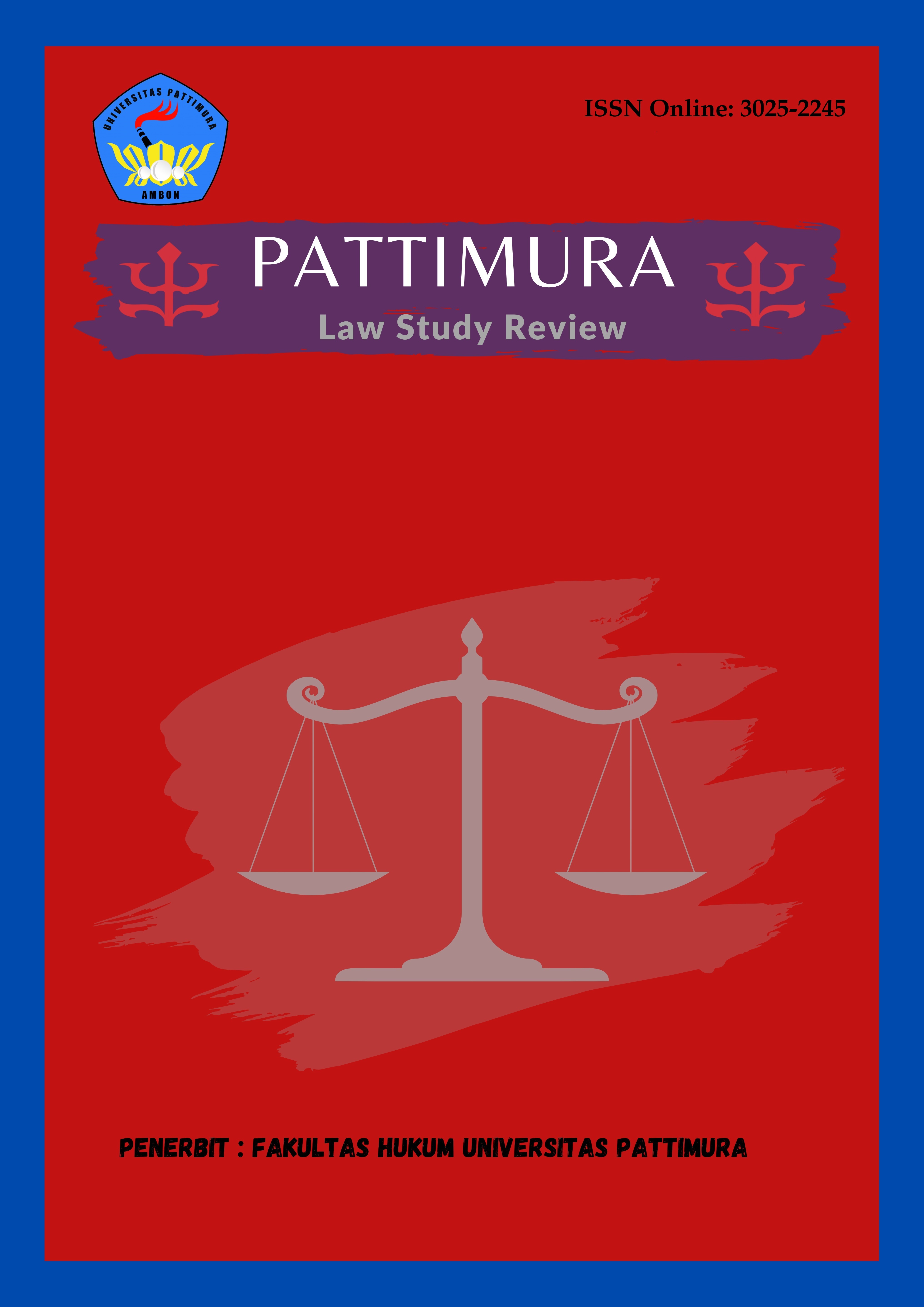Keabsahan Pengangkatan Anak Piara Mantan Raja Sebagai Kepala Pemerintah Negeri (Desa)
Abstract
Article 3 paragraph (2) of the Malteng Regional Regulation No. 1 of 2006 stipulates that "the position of the head of the State government is the right of certain families/descendants based on a straight line and cannot be transferred to other parties except in special matters determined based on the results of the deliberations of the family/descendants who are entitled to the State Saniri. It is reaffirmed in Article 3 paragraph (1) of the Regional Regulation of Central Maluku Regency Number 3 of 2006 concerning Procedures for the Nomination, Election and Inauguration of the Head of State Government stipulates that "The position of the Head of State Government is the right of certain heads of the house/descendants to determine based on the deliberation of the heads of the houses/descendants. This type of research is Empirical Juridical, In this study the approach used in solving the problem is by using the empirical juridical approach method, the data that has been collected is analyzed qualitatively whose decomposition is systematically arranged based on legal disciplines to achieve clarity of the problem to be discussed. The results of this study show that the position of the Head of State Government is the right of the family/descendants of the parentah, as stipulated in the provisions of Article 3 Paragraph (1) of the Malteng Regional Regulation No. 3 of 2006 which stipulates that the position of the Head of State Government is the right of the family/descendants to determine based on the deliberation of the family/descendants. Therefore, the appointment of the former king's son as the head of the government has no validity, for this reason the appointment of Muhammad R. Fahlefi Ely as the Head of the Assilulu State Government has no validity. The appointment of Muhammad Fahlevi Ely as the Head of the Assilulu State Government in an authoritative manner is not in accordance with the mandate of the Central Maluku Regency Regional Regulation No. 1 of 2006 and the Central Maluku Regency Regional Regulation No. 3 of 2006, where Muhammad R. Fahlefi Ely is the Son of the Former King and not based on the descendants of the family in a straight line, therefore due to the law of the appointment of Muhammad Fahlevi Ely as the Head of the Assilulu State Government does not have validity, and is considered null and void, as formulated in Article 70 Paragraph of Law Nomor 30 of 2014.
Downloads
References
Buku
Bahder Johan Nasution, Metode Penelitian Ilmu Hukum, CV. Mandar Maju, Bandung, 2008
Effendi Ziwar. Hukum Adat Ambon Lease, Pradya Paramita, Jakarta, 1987
Nita Matul Huda, Hukum Tata Negara Indonesia. Grafindo Persada. Yogyakarta. 2005
Ridwah H R. Hukum Administasi Negara, RajaGrafindo Persada. Jakarta, 2006
Van Apeldoorn L. J, Pengantar Ilmu Hukum, Pradnya Paramita, Jakarta 2005
Jurnal dan Lain-lain
Bakarbessy D. A. Interaksi Antara Negara Dan Desa Adat Dalam Konstruksi Negara Kesatuan Republik Indonesia. 2018
Chelsy Sahertian, Jemmy Jefry Pietersz, Yohanes Pattinasaranya Keabsahan Kebijakan Pemerintah Kabupaten Seram Bagian Barat Mengenai Pemilihan Kepala Desa Adat Secara Serentak, TATOHI Jurnal Ilmu Hukum Vol 1, No 10 (2021)
Eric Stenly Holle, Sistem Pengangkatan Dan Pemilihan Kepala Pemerintah Negeri Di Maluku Tengah Kajian Dari Perspektif Pembangunan Demokrasi di Indonesia,Skripsi, Fakultas Hukum Universitas Pattimura Ambon
https://www.google.com/search/hl=in-ID&source=android-browser&ei=DesaAdat
Muhhamad Mustafal Bakri Ely, Tetua dalam Marga Ely, 30 November 2024
Copyright (c) 2025 Mohamad Z Firmansyah, Andress Denny Bakarbessy, Yohanes Pattinasarany (Author)

This work is licensed under a Creative Commons Attribution-NonCommercial 4.0 International License.
Authors who publish their manuscripts in this Journal agree to the following conditions:
- The copyright in each article belongs to the author, as well as the right to patent.
- Authors are able to enter into separate, additional contractual arrangements for the non-exclusive distribution of the journal's published version of the work (e.g., post it to an institutional repository or publish it in a book), with an acknowledgment of its initial publication in this journal.
- Authors are permitted and encouraged to post their work online (e.g., in institutional repositories or on their website) prior to and during the submission process, as it can lead to productive exchanges, as well as earlier and greater citation of published work.
- Authors have the right to self-archiving of the article (Author Self-Archiving Policy)













